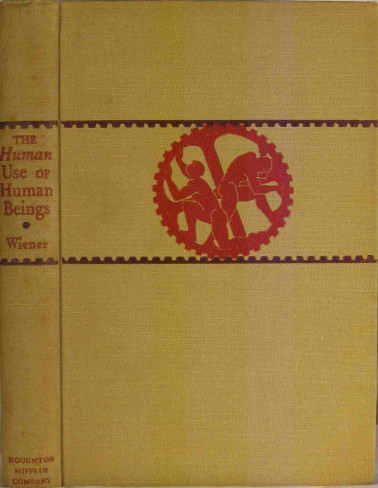Alain Badiou: The Communist Hypothesis (2009–)
Filed under book | Tags: · communism, neoliberalism, philosophy, politics

“A new program for the Left after the death of neoliberalism.
Alain Badiou’s formulation of the “communist hypothesis” has traveled around the world since it was first aired in early 2008, in his book The Meaning of Sarkozy. The hypothesis is partly a demand to reconceptualize communism after the twin deaths of the Soviet Union and neoliberalism, but also a fresh demand for universal emancipation. As “third way” reforms prove as empty in practice as in theory, Badiou’s manifesto is a galvanizing call to arms that needs to be reckoned with by anyone concerned with the future of our planet.”
First published as L’hypothèse communiste, 2009.
Translated by David Macey and Steve Corcoran
Publisher Verso, 2010
ISBN 1844676005, 9781844676002
279 pages
PDF (2 MB, updated on 2020-7-6)
Comment (0)Norbert Wiener: The Human Use of Human Beings: Cybernetics and Society (1950–) [EN, FR, BR-PT, RU, ES, SC, IT, GR]
Filed under book | Tags: · computing, cybernetics, entropy, machine, society, theory of communication

“Founder of the science of cybernetics—the study of the relationship between computers and the human nervous system—Wiener was widely misunderstood as one who advocated the automation of human life. As this book reveals, his vision was much more complex and interesting. He hoped that machines would release people from relentless and repetitive drudgery in order to achieve more creative pursuits. At the same time he realized the danger of dehumanizing and displacement. His book examines the implications of cybernetics for education, law, language, science, technology, as he anticipates the enormous impact—in effect, a third industrial revolution—that the computer has had on our lives.”
Publisher Houghton Mifflin, Boston, 1950
241 pages
New edition
With an Introduction by Steve J. Heims
Published by Free Association Books, London, 1989
ISBN 1853430757
xxx+199 pages
Wikipedia (EN)
The Human Use of Human Beings: Cybernetics and Society (English, 1950, added on 2021-4-8)
The Human Use of Human Beings: Cybernetics and Society (English, 1950/1989, updated on 2021-4-8)
Cybernétique et société: l’usage humain des êtres humains (French, 1952/2014, EPUB, added on 2021-4-8)
Cibernética e sociedade: o uso humano de seres humanos (BR-Portuguese, trans. José Paulo Paes, 2nd ed., 1954/1968, added on 2013-12-12)
Kibernetika i obshchestvo (Russian, trans. E.G. Panfilov, 1958, DJVU, added on 2021-4-8)
Cybernética y sociedad (Spanish, trans. José Novo Cerro, 1958, added on 2021-4-8)
Kibernetika i društvo: ljudska upotreba ljudskih bića (Serbo-Croatian, trans. Ljubomir Radanović, 1964, added on 2021-4-8)
Introduzione alla cibernetica: l’uso umano degli esseri umani (Italian, trans. Dario Persiani, 1966, added on 2021-4-8)
Kyvernētikē kai koinōnia: ē anthrōpinē chrēsimopoiēsē tōn anthrōpinōn ontōn (Greek, trans. Giannē Iōannidē, 1970, DJVU, added on 2021-4-8)
Lewis Mumford: Technics and Civilization (1934-) [English, Spanish]
Filed under book | Tags: · economy, history, history of technology, industrial revolution, machine, technics, technology

The book gives the history of technology and its interplay in shaping and being shaped by civilizations. Mumford asserts that the development of modern technology, rather than springing up during the Industrial Revolution, has its roots in the Middle Ages. He argues it is the moral, the economic, and the political choices we make, not the machines we use that has produced a capitalist industrialized machine-oriented economy, whose imperfect fruits serve the majority so imperfectly. The development of technology is divided into three overlapping phases: ecotechnic, paleotechnic and neotechnic.
First published in England, 1934
Publisher: Routledge & Kegan Paul Ltd, London, Seventh impression, 1955
496 pages
Wikipedia (EN)
Technics and Civilization (English, 1934/1955, updated on 2014-3-19)
Tecnica y civilizacion (Spanish, trans. Aznar de Acevedo, 1971/1992, updated on 2014-3-19)

